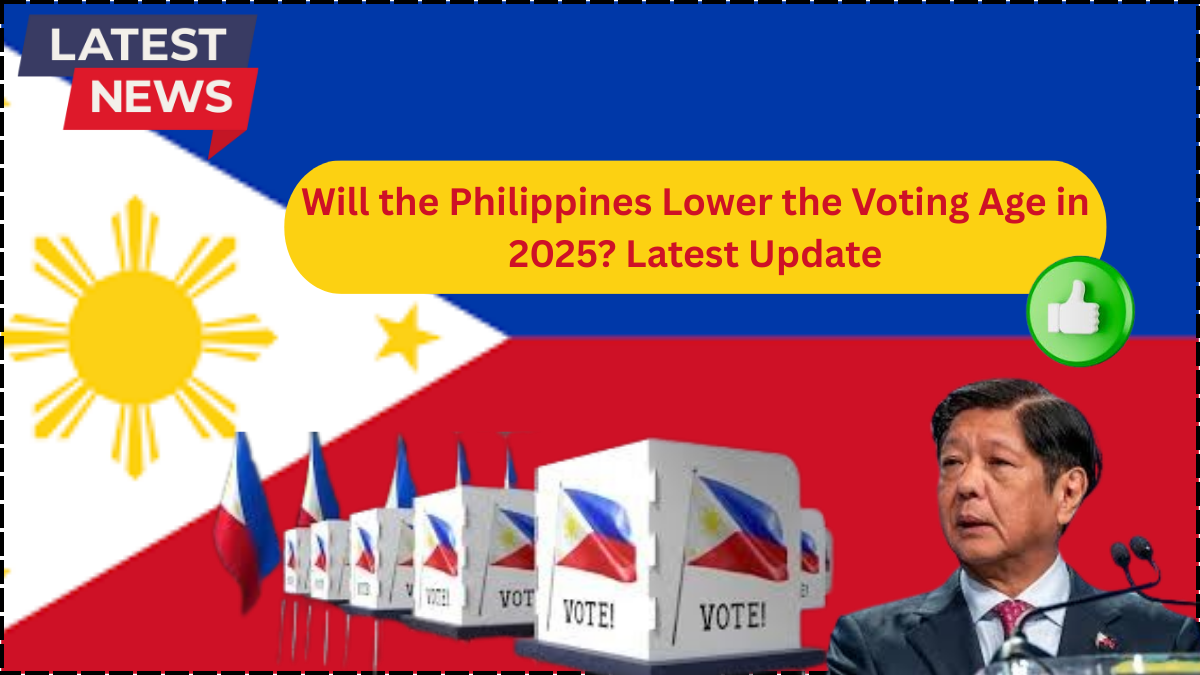The issue of lowering the minimum voting age in the Philippines is gaining fresh attention ahead of the 2025 midterm elections. Lawmakers, advocacy groups, and youth organizations are actively debating whether the country should reduce the voting age from 18 to 16. This potential shift has sparked questions about political maturity, civic engagement, and the evolution of election law in the Philippines.

Here’s the latest update and a comprehensive breakdown of what this proposed change could mean for Filipino democracy.
What Is the Current Minimum Voting Age in the Philippines?
As it stands, the minimum voting age in the Philippines is 18. This has been the legal standard since the 1987 Constitution established universal suffrage for Filipino citizens aged 18 and above. Eligible voters must also be residents of the Philippines for at least one year and residents of their voting district for at least six months before an election.
The Proposal: Lowering the Voting Age to 16
Several lawmakers have introduced bills in both houses of Congress aiming to reduce the voting age to 16. Proponents argue that Filipino youth are more politically aware and socially active than ever before. Social media platforms and digital access have allowed young people to engage in national conversations on issues like climate change, education reform, and human rights.
For example, House Bill No. 9210, filed in the 19th Congress, proposes to amend the Omnibus Election Code to recognize 16-year-olds as eligible voters. The bill’s authors believe that earlier civic participation fosters long-term democratic responsibility and stronger community engagement.
Arguments for Lowering the Voting Age PH 2025
Supporters of the initiative cite several compelling reasons:
Youth Involvement in Nation-Building: Filipino teenagers are often at the forefront of community service, advocacy movements, and online campaigns. Enfranchising them could harness their energy in more formal political participation.
Global Trends: Countries like Brazil, Argentina, and Austria have already adopted a lower voting age. Advocates believe the Philippines should follow suit to stay aligned with progressive democratic values.
Early Political Education: Many argue that voting is a habit best formed early. Allowing 16-year-olds to vote may lead to higher lifetime voter turnout and greater political literacy.
Opposition and Concerns
Not everyone agrees with changing the voting age PH 2025. Critics raise valid concerns:
Readiness and Maturity: Some believe that 16-year-olds may lack the life experience or knowledge to make informed electoral choices.
Potential for Manipulation: There’s concern that younger voters may be more vulnerable to misinformation or undue influence, particularly on social media.
Logistical Challenges: Adjusting the national voter registry, education materials, and poll staffing to accommodate younger voters may strain the Commission on Elections (COMELEC).
Status Update: Where Do Things Stand in 2025?
As of mid-2025, the bills proposing to lower the minimum voting age in the Philippines remain under deliberation in congressional committees. No final decision or law has been passed yet. The Commission on Elections has not issued a formal stance but has expressed readiness to implement changes should legislation be approved.
For now, the voting age remains at 18. However, public hearings, youth consultations, and expert forums are ongoing, signaling that this issue will remain part of the political conversation through and beyond the 2025 elections.
How Would This Change Affect the Election Law in the Philippines?
If passed, the change would mark a significant amendment to the Omnibus Election Code, one of the foundational laws governing Philippine elections. It would require revisions in:
Voter registration policies
Civic education curricula
Election guidelines for schools and communities
Voting logistics such as ballots and precinct assignments
Such a shift would not only redefine electoral demographics but could also influence campaign strategies, pushing political parties to address issues relevant to a younger electorate.
FAQs
Q1: What is the current voting age in the Philippines?
A: As of 2025, the minimum voting age in the Philippines is 18 years old.
Q2: Will 16-year-olds be able to vote in the 2025 elections?
A: No. Although there is a proposal to lower the voting age to 16, it has not yet been enacted into law.
Q3: What are the main arguments for lowering the voting age?
A: Supporters argue it enhances civic participation, reflects global trends, and encourages early political engagement.
Q4: Are there other countries with a voting age of 16?
A: Yes. Austria, Brazil, and Argentina are among the countries that allow 16-year-olds to vote.
Q5: How will this affect the election law in the Philippines?
A:If implemented, it would require legislative amendments and adjustments in voter education, registration systems, and polling operations.
click here to learn more